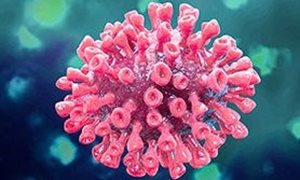10 July 2018
Invasive aspergillosis (IA) is a severe infection that can occur in severely immunocompromised patients. Efficient immune recognition of Aspergillus is crucial to protect against infection, and previous studies suggested a role for NOD2 in this process. However, thorough investigation of the impact of NOD2 on susceptibility to aspergillosis were lacking. Common genetic variations in NOD2 have been associated with Crohn's disease and now Van de Veerdonk and colleagues, investigated the influence of these genetic variations on the anti-Aspergillus host response. A NOD2 polymorphism reduced the risk of IA after hematopoietic stem-cell transplantation. Mechanistically, absence of NOD2 in monocytes and macrophages increases phagocytosis leading to enhanced fungal killing. Conversely, NOD2 activation reduces the antifungal potential of these cells. Crucially, Nod2 deficiency results in resistance to Aspergillus infection in an in vivo model of pulmonary aspergillosis. Collectively, these data demonstrate that genetic deficiency of NOD2 plays a protective role during Aspergillus infection.
 Frank van de Veerdonk, theme Infectious diseases and global health, and colleagues, demonstrate in Nature Communications, that genetic deficiency of NOD2 plays a protective role during Aspergillus infection.
Frank van de Veerdonk, theme Infectious diseases and global health, and colleagues, demonstrate in Nature Communications, that genetic deficiency of NOD2 plays a protective role during Aspergillus infection.
Invasive aspergillosis (IA) is a severe infection that can occur in severely immunocompromised patients. Efficient immune recognition of Aspergillus is crucial to protect against infection, and previous studies suggested a role for NOD2 in this process. However, thorough investigation of the impact of NOD2 on susceptibility to aspergillosis were lacking. Common genetic variations in NOD2 have been associated with Crohn's disease and now Van de Veerdonk and colleagues, investigated the influence of these genetic variations on the anti-Aspergillus host response. A NOD2 polymorphism reduced the risk of IA after hematopoietic stem-cell transplantation. Mechanistically, absence of NOD2 in monocytes and macrophages increases phagocytosis leading to enhanced fungal killing. Conversely, NOD2 activation reduces the antifungal potential of these cells. Crucially, Nod2 deficiency results in resistance to Aspergillus infection in an in vivo model of pulmonary aspergillosis. Collectively, these data demonstrate that genetic deficiency of NOD2 plays a protective role during Aspergillus infection.
Related news items

Trained immunity: a tool for reducing susceptibility to and the severity of SARS-CoV-2 infection
17 February 2021 In a review in Cell Mihai Netea, Frank van de Veerdonk, Reinout van Crevel and Jorge Dominguez Andres propose that induction of trained immunity by whole-microorganism vaccines may represent an important tool for reducing susceptibility to and severity of SARS-CoV-2. go to page
Invasive fungal infections in influenza and COVID-19
8 July 2020 The Aspergillus fungus is found in the lungs of many COVID patients. A parallel occurs with influenza patients, who often develop a serious fungal infection. Although such a serious fungal infection seems to occur less frequently in COVID-patients, alertness remains necessary, go to page
Trained immunity: a tool for reducing susceptibility to and the severity of SARS-CoV-2 infection
29 June 2020 In a review in Cell Mihai Netea, Frank van de Veerdonk, Reinout van Crevel and Jorge Dominguez Andres propose that induction of trained immunity by whole-microorganism vaccines may represent an important tool for reducing susceptibility to and severity of SARS-CoV-2. go to page.aspx?width=2120&height=1414&ext=.jpg&type=BlockColumn1Zoom1)
New insight into the effect of hydroxychloroquine undermines its use in corona
11 June 2020 Researchers at Radboud university medical center have discovered an as yet unknown effect of hydroxychloroquine. Raphael Duivenvoorden was interviewed in the program Op1 at NPO1 to elaborate on the findings. It seems unlikely that chloroquine has beneficial effect in corona infections. go to page
Terrestrial bacteria can grow on nutrients from space
26 May 2020 Researchers from the Radboudumc describe in an article in Astrobiology that bacteria can survive on an 'extraterrestrial diet', which affected their pathogenic potential. go to page
